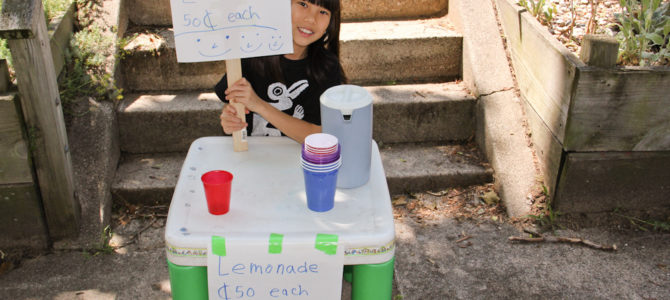
There is nothing more American than little kids in the neighborhood running a lemonade stand. It’s not a European thing, nor is it a Chinese thing. Only in America. For generations, lemonade stands have become a staple of summer and, like apple pies, one of the best things to demonstrate the American spirit: earning your own spending money through entrepreneurship.
That’s why Jennifer Knowles, a Denver mom of three boys, thought it was a good idea to have her boys run a lemonade stand in their Stapleton, Colorado, neighborhood this past Memorial Day. She hoped to teach her boys lessons she learned when she had her own lemonade stand as a little girl — entrepreneurship, responsibility, and the value of running your own business.
Her boys decided to take it a step further: they planned to donate all proceeds from their lemonade stand to a charity organization called Compassion International. More specifically, the boys picked a little 5-year-old boy from Indonesia through Compassion International, for whom their proceeds would help provide necessities including clean water.
On Memorial Day, the weather was nice and hot. The three boys set up their lemonade stand with mom’s help. Two cups of lemonade for $1. The 6-year-old even brought his toy cash register and he got good practice in addition and subtraction. All three boys got good practice in customer service. Many people stopped by and praised the boys for doing a good job. The boys were feeling pretty good about themselves. Unfortunately, half an hour into their first business venture, police showed up.
Apparently, someone called the police to complain that the boys were running a lemonade stand without a permit. So the police showed up to shut this little illegal operation down. According to Jennifer, the boys were “crushed and devastated.” Her 4-year-old heard what the police were saying and started to cry.
Colorado doesn’t have any specific rule that either prohibits or protects a child-run lemonade stand. Yet what kind of sick person would call the cops on a hot sunny day to complain about three little kids and their lemonade stand? Why didn’t the police tell the person who complained to take a hike? Shouldn’t the valuable and limited police resources be better spent on something like catching a drunk driver? Why did the police respond and why did they feel it was the right thing to shut down a perfectly innocent lemonade stand and to scare little kids who were trying to do something good and honorable?
It turns out local wars against kids’ lemonade stands have been going on for some time. A CNBC report in 2015 documented the kind of bureaucracies that aspiring and entrepreneurial American kids are up against. On August 6, 2010, county officials of Portland, Oregon, told a 7-year-old girl that she would be fined $500 if she continued selling lemonade without first obtaining a $120 permit to do so.
On August 8, 2013, police in Queens, New York, shut down a lemonade stand run by 9-year-old Nora and 11-year old Jameala, citing that anyone who operates any food stand is required to get a permit from the Department of Health with no exceptions. On May 18, 2014, San Francisco police shut down two adolescents’ lemonade stands. One of those stand owners, an 11-year-old, was told that simply giving away the fudge brownies and lemonade the police forbade her from selling would result in a $1,500 fine.
As you can imagine, obtaining a food permit is costly. Getting one from local authorities usually costs around $120 per year. A similar permit from the Department of Health costs $388 for two years. In addition, there is a $70 application fee, a $25 endorsement fee and a $43.3 technology fee. This means those would-be young entrepreneurs will be roughly $500 in red before they even set up their little operations. Given that fact that a cup of lemonade is usually sold for $1, these children will have to sell a lot of lemonade just to break even.
Even some adults realized that they have gone too far. The State of Utah passed a law last year to legalize lemonade stands and other businesses run by kids, which means cities and counties cannot require a license or permit for any occasional business operated by a minor. It’s sad that lawmakers have to use legislative resource to address something that should be dealt with common sense. Yet kids in Utah should consider themselves lucky, because what happened to Jennifer Knowles’ boys in neighboring Colorado is the latest testament that war on lemonade stands is still on.
For more than 200 years, entrepreneurs of all skin color and backgrounds have been the engine of the U.S. economy and their grits and hard work have created America’s enormous economic success. But by 2016, the new business creation rate in the U.S. is at nearly a 40-year low. Consequently, new jobs come from new businesses that are less than a year old reached new low too. It peaked in 1999 — about 4.7 million jobs came from startups. in 2015, only 3 million came from startups,
If you wonder why we don’t have more people like Jeff Bezos and why today’s young people seem not to have the similar appreciation for hard work like previous generations did, look no further than the missing lemonade stands that have been busted by adults who seemingly lack better things to wage their power at. When bureaucracies stop American children’s ambition and use government power to turn something sweet into something sour, we as a nation are walking down a path of a self-inflicted decline.









